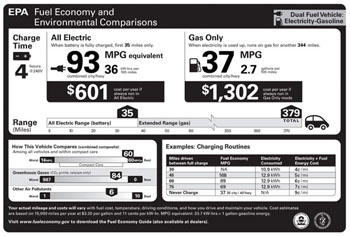 The EPA has released its official mileage ratings for the Chevy Volt, and Dodd is unimpressed:
The EPA has released its official mileage ratings for the Chevy Volt, and Dodd is unimpressed:
The woefully limited 35-mile range on battery and mere 37 MPG on gas leaves one wondering what all that hype was really about.
I don’t actually care about the Volt all that much, but this is a really common reaction and seems completely misguided to me. No car is designed to appeal to every single person, and the Volt is no exception. It’s designed mostly to appeal to a specific kind of driver: someone who does the great bulk of their driving around town, maybe 20 or 30 miles a day at most, but occasionally needs to drive further and doesn’t want to buy a second car just for those occasions. There are lots of people like that, and for them the Volt is great. They’ll spend 98% of their time running solely on battery power and recharging at night when rates are low, and 2% of their time getting 37 mpg — which is actually pretty damn good. There are a few hybrids that do slightly better and one hybrid (the Prius) that does a lot better, and that’s about it.
If you commute a hundred miles a day, the Volt isn’t for you. If you’re a traveling salesman, it’s not for you. If you need to haul around a Boy Scout troop, it’s not for you. If you need lots of towing capacity, it’s not for you. But that’s not a problem. It’s not supposed to be for you. It’s for people who drive ten miles to work each day, run some errands on the weekend, and drive out to grandma’s house once a month. Those folks are going to get pretty awesome fuel efficiency, and they’re going to get it with just one car. What’s not to like?1
1Answer: the price tag. That’s really the car’s only serious Achilles’ heel. Even after the government rebate, it’ll run you around $33,000 for a car that would cost less than $20,000 with a standard engine. Until the price of the car comes down, it’s going to be a tough sell for anyone who’s not dazzled by its eco-friendliness.
















